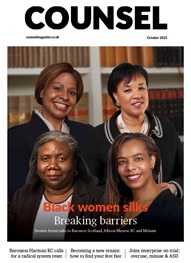*/
Opening the family courts to the media has now settled “into a kind of limbo of uncertainty” the President of the Family Division has said.
Speaking about the changes in media reporting which allow accredited press the right to be present at private hearings of children proceedings, Sir Mark Potter commented: “Following the initial flurry of interest in the first few days, things have settled into a kind of limbo of uncertainty while the government works out the next step toward a coherent scheme in final form. Ministers have still to work out and give directions to their civil servants where their priorities lie between their professions of concern for the privacy and welfare of the child and their apparent desire to satisfy the demands of the press in relation to so-called transparency.”
However, he said that the government now plans “to introduce a Bill, in the next session of Parliament, to repeal s 12 of the Administration of Justice Act 1960 and amend s 97(2) of Children Act 1989 and s 33 of the Children and Young Persons Act 1933 in so far as they relate to family cases”.
He warned that “if the new regime is not carefully thought out, the consequent burden and real cost will fall not on the media but on those judges, magistrates and advocates who will be required to consume time arguing and deciding press-related issues, rather than concentrating on the case in hand. At a time when the courts’ expanding workload is increasing with no additional judges or court days, this would be a particularly regrettable development.”
The development would also be “regrettable from the point of view of the profession: it would be yet another expense to be absorbed by them within any fee regime imposed upon them by the LSC and a yet a further disincentive to experienced advocates to engage in children work,” he added.
Sir Mark Potter was speaking at the Family Law Conference on 15 October.
However, he said that the government now plans “to introduce a Bill, in the next session of Parliament, to repeal s 12 of the Administration of Justice Act 1960 and amend s 97(2) of Children Act 1989 and s 33 of the Children and Young Persons Act 1933 in so far as they relate to family cases”.
He warned that “if the new regime is not carefully thought out, the consequent burden and real cost will fall not on the media but on those judges, magistrates and advocates who will be required to consume time arguing and deciding press-related issues, rather than concentrating on the case in hand. At a time when the courts’ expanding workload is increasing with no additional judges or court days, this would be a particularly regrettable development.”
The development would also be “regrettable from the point of view of the profession: it would be yet another expense to be absorbed by them within any fee regime imposed upon them by the LSC and a yet a further disincentive to experienced advocates to engage in children work,” he added.
Sir Mark Potter was speaking at the Family Law Conference on 15 October.
Opening the family courts to the media has now settled “into a kind of limbo of uncertainty” the President of the Family Division has said.
Speaking about the changes in media reporting which allow accredited press the right to be present at private hearings of children proceedings, Sir Mark Potter commented: “Following the initial flurry of interest in the first few days, things have settled into a kind of limbo of uncertainty while the government works out the next step toward a coherent scheme in final form. Ministers have still to work out and give directions to their civil servants where their priorities lie between their professions of concern for the privacy and welfare of the child and their apparent desire to satisfy the demands of the press in relation to so-called transparency.”


Justice system requires urgent attention and next steps on the Harman Review
Q&A with Tim Lynch of Jordan Lynch Private Finance
By Marie Law, Director of Toxicology at AlphaBiolabs
By Louise Crush of Westgate Wealth Management
Why Virtual Assistants Can Meet the Legal Profession’s Exacting Standards
Despite increased awareness, why are AI hallucinations continuing to infiltrate court cases at an alarming rate? Matthew Lee investigates
Many disabled barristers face entrenched obstacles to KC appointment – both procedural and systemic, writes Diego F Soto-Miranda
The proscribing of Palestine Action under the Terrorism Act is an assault on the English language and on civil liberties, argues Paul Harris SC, founder of the Bar Human Rights Committee
For over three decades, the Bar Mock Trial Competition has boosted the skills, knowledge and confidence of tens of thousands of state school students – as sixth-form teacher Conor Duffy and Young Citizens’ Akasa Pradhan report
Suzie Miller’s latest play puts the legal system centre stage once more. Will it galvanise change? asks Rehna Azim